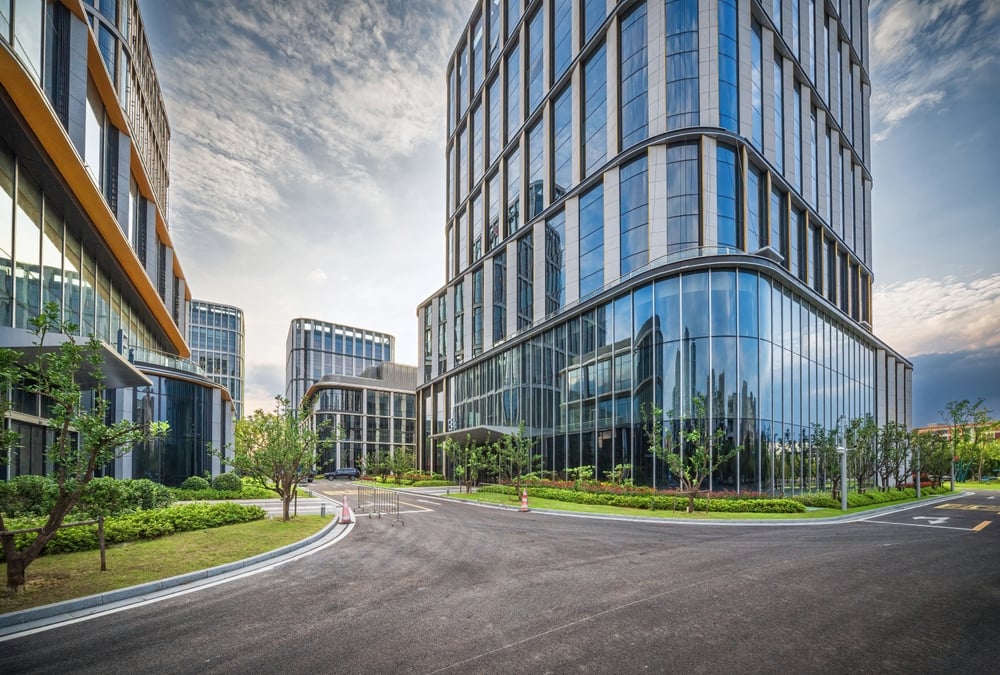It’s clear that the pandemic has caused a shift in the way we think about commercial property and its usage. During lockdown, many high street retailers were forced to close, and more people started working from home than ever before, reducing reliance on physical office locations, and leading to a reduction in office space requirements and the loss of tenants. Buildings in central London now have a vacancy rate of 9.4%, almost double the long-term average of 5.5%. This has led to a growing interest amongst investors in repurposing or redefining underperforming or underused buildings.
Lloyds Banking Group has recently announced plans to redevelop some of its decommissioned group data centres and former office sites into new social housing projects. The construction of the first site in Pudsey, is set to commence in 2026.
Canary Wharf Group has also unveiled plans to revamp the 42-storey HSBC tower when the bank moves out in 2027. The property company intends to carve out sections of the tower’s facade to create terraces and transform the block into a mixed-use building that would include leisure facilities and a public viewing gallery. The project is set to cost between £400 and £800 million.
Another famous commercial redevelopment project is Battersea Power Station, which was converted into a community of homes, shops, bars, restaurants, cafes, offices and over 19-acres of public space. The £9 billion project which completed in 2022 turned the industrial brownfield site into a vibrant, mixed-use development, complete with a Zone 1 extension to the London Underground Northern Line.
If you’re considering redeveloping some or all of your commercial portfolio, this type of project clearly doesn’t come cheap, however there are a range of financing options available to help.
Get in the Know
Subscribe to our newsletter
What is development finance?
Development finance is an umbrella term that covers a range of lending options and can be used to cover the costs of large-scale commercial, residential and mixed-use property development. It can be used to purchase property or land, or put towards refurbishments, extensions or conversions. This type of funding can allow you to take on a much larger project than you may have available funding for.
Development finance is usually split into two parts, ‘purchase finance,’ which allows you to purchase the property, and ‘project finance,’ which allows you to fund each stage of the development. We explore some of the main types of development finance below.
What types of development finance are available?
1) Commerical mortgages
A commercial mortgage is simply a loan secured on a commercial property, such as an office block, shopping centre, or apartment complex, and can be used to buy, refinance, or redevelop a commercial property. Typically borrowing is taken out to fund the construction or redevelopment of a commercial property which is intended to be sold or rented to a third party upon completion of works.
2) Mezzanine finance
Mezzanine finance usually targets the construction stage of the project, such as improvements to, or renovations of existing buildings. It’s usually sourced in addition to any senior debt (your main source of financing such as a mortgage) and money raised from investors, helping to bridge the gap between these two options and provide the necessary capital to complete your commercial project.
3) Bridging loans
A bridging loan is a form of short-term financing used primarily by property developers and investors to finance renovations or secure new commercial property. These loans bridge the gap between immediate funding requirements and longer-term financing solutions, for example if your commercial project is running longer than planned, a bridging loan can help whilst you wait for permanent financing. Because bridging loans can be arranged quickly (usually within two weeks), they’re an excellent option if you need a speedy solution.
Auction finance is a type of bridging loan that allows you to cover the gap between the property purchase and the arrangement of more permanent finance, such as a mortgage. This is helpful as auction purchases generally must be completed fairly quickly; usually within 28 days of the auction.
4) Joint venture finance
Joint venture finance is a method of developing property without using your own money. The lender provides all the money needed to complete the project, and profits are shared on the sale of the site, typically on a 50/50 basis. This type of finance is usually only available to more experienced property developers with a proven track-record of delivering successful projects. This financial arrangement means the developer isn’t held up by a lack of funds, and the project can start quickly.
What should I look for in a development finance broker?
It’s important to look for a broker experienced in obtaining multi-million-pound development finance, who has successfully closed similar deals and can provide tangible case studies. They’ll have access to industry connections and extensive market knowledge which can prove invaluable.
Different projects require different financing solutions, and an experienced broker will help tailor a solution to the specific needs of your project, via access to their broad network of banks, private investors and specialised finance providers. They’ll be able to help you prepare a strong application for your case, navigating key factors that influence lenders’ decisions, such as loan-to-cost ratio, loan-to-value ratio, experience of the developer, and project feasibility, increasing your chances of securing financing. They can also help gather the required documentation, and negotiate with lenders on your behalf, offering support throughout the process.
Of course not all developments need to be on the same scale as Battersea or Canary Wharf, and arguably the founding principles of such projects apply across the board regardless of funding requirements. But invariably one of the trickiest elements is navigating the market on your own and figuring out who is best positioned to help support you unique project and situation. In this instance prior experience, network strengthen and diligence are not just extremely valuable but essential. At Enness we have aided many hundreds of commercial development projects get funding and thrive.
To find out more about how development finance could help you repurpose or maximise your commercial property portfolio, please get in contact.
The views and opinions expressed in this piece are those of the author and do not constitute advice or a recommendation. They do not necessarily reflect the official policy or position of Enness and are not intended to indicate any market or industry viewpoints, or those of other industry professionals





